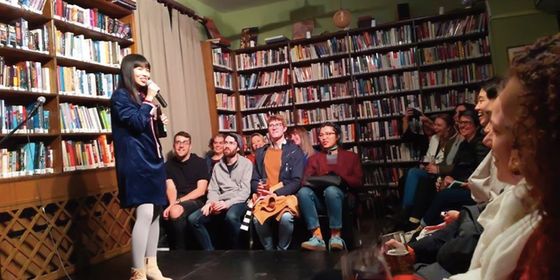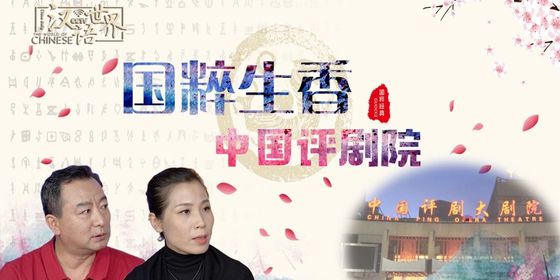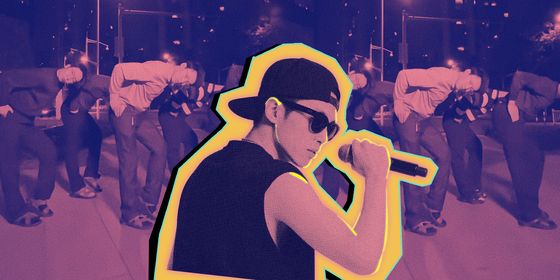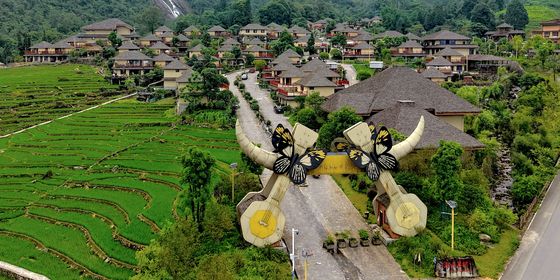Celebrity culture is transforming traditional Chinese comedy, but not all fans are impressed
In an auditorium modified to look like a traditional tea house, two men in silk robes begin performing a type of rapid-fire banter that dates back to the late Qing dynasty (1616 – 1911). But rather than the old men that have patronized such shows for centuries, the audience members laughing below are mostly young women waving glowsticks and snapping photos of the performers on stage.
“My dad used to enjoy watching crosstalk shows, but he can’t get tickets now,” crosstalk enthusiast Guanerjia Yue complains to TWOC. According to longtime fans like Guanerjia, the ancient performing art is being threatened by the rise of “Deyun fangirls,” young women who follow the stars of comedy troupe Deyun Society as if they were teenage pop idols. “They don’t care about the performance but snap up all the tickets in one second,” Guanerjia claims.
The Deyun Society is one of China’s most famous comedy clubs. It has transformed traditional crosstalk comedy, once attractive mainly to older generations, into a modern sensation followed by millions of young fans online.
But Deyun has also been accused of commercializing the traditional comic medium and diluting the quality of crosstalk. With the help of social media platforms like Douyin (TikTok) and Weibo, young Deyun actors have accumulated huge fan bases. Zhang Yunlei, one of the most popular Deyun actors, has 900 million fans on Weibo.
Crosstalk is a live comedy performance normally featuring two people conversing on stage. According to Guo Degang, founder of Deyun Society and a leading figure in the renaissance of traditional Chinese comedy, “Crosstalk has been passed down since late Qing dynasty. Performers tease, ridicule, and curse, reflecting the bitterness and sweetness of life. It carries the joy and sorrow of Chinese people through humorous dialogue.”
The term crosstalk, or xiangsheng (相声), was originally written “象声,” with the character “象” expressing similarity or imitation. Early forms of crosstalk saw performers imitating animal noises. Later, they began to draw on folk tales and jokes to extoll the good and reflect the dark side of society.
In the 1990s, however, crosstalk began to lose audiences to other forms of comedy and TV. Around the same time, many well-known crosstalk performers abandoned the traditional medium to take up more lucrative roles in movies or other comedy genres.
The proliferation of TV saw a shift from traditional crosstalk, which works best with a live audience, to sketch shows similar to those in the West. Driven by performers from China’s northeastern provinces, short sketch shows, or xiaopin (小品), have become the most popular skits during CCTV’s annual Spring Festival Gala, leaving crosstalk in the doldrums.
To revive crosstalk, actors had to return to theaters. It was in this atmosphere that Guo founded the Deyun Society in 1995. Deyun now has its own theaters in Beijing, Nanjing, Harbin, and Changchun. Tickets are priced low, so that crosstalk can remain accessible to a wide audience.
Since its foundation, Deyun has proved remarkably successful. Guo supposedly achieved 25 encores during one performance, and he became the first crosstalk actor to hold a personal show in the Great Hall of the People in Beijing. He has also become a successful TV host, appearing on influential comedy variety show Top Funny Comedian.
Guo and the Deyun Society have also helped preserve crosstalk scripts, many of which were lost or destroyed during the Cultural Revolution. With other crosstalk performers, Guo has gathered and organized more than 600 classic pieces of Chinese folk tales, which often form the basis for crosstalk skits.
These nods to tradition appeal to Gao Hong, a millenial fan of Deyun from Inner Mongolia. “The first time I watched Guo Degang’s crosstalk, I was immediately attracted by his performance. Guo is good at Hebei clapper opera and pingju, which are familiar to me since my grandma loved listening to Peking opera when I was young,” she tells TWOC.
While preserving traditional pieces, Deyun also paved the way for commercialization of the medium. To optimize their performances for TV, Guo and his team modified their skits to be more concise, and incorporated regional dialects, popular buzzwords, and internet slang.

Young women made up of 90 percent of the audience at a Harbin crosstalk show by Zhang Yunlei in 2018 (VCG)
Last week, the Deyun Society announced its first live crosstalk show since the coronavirus outbreak. Tickets were sold out in seconds, with demand is driven by young women who now represent the majority of crosstalk’s audience. Like fans of pop stars, “Deyun girls” splurge on tickets to crosstalk shows and follow their favorite actors at airports and TV stations, asking for autographs. Fans even organize to defend their idols online and promote their work.
Older enthusiasts complain that the younger generation of actors lack the skills of comedians past, and are more focused on cultivating their celebrity than honing their craft. “The theater is full of Deyun girls, and it is rare to see elderly audience members,” Guanerjia laments to TWOC.
Netizens also complain about young performers’ poor acting skills: “Qin Xiaoxian is the worst one. I can’t believe he was chosen to perform in variety shows,” a user on Douban, a film and book review platform, wrote about one of Deyun’s rising stars, who is known for his youth and good looks but is frequently slammed for his acting online.
Other fans are more cautiously optimistic, feeling that change is necessary to preserving the medium. “Even if nine out of the ten people who are attracted to crosstalk by the young actors are ‘blind fans,’ at least there is still one rational viewer,” Gao argues. “These crazy fans might be transformed into [real] enthusiasts later if the actors improve their skills.”
As attention on crosstalk actors increased, so has the scrutiny of their actions. Last year, Deyun’s Zhang Yunlei was slammed for making jokes about the 2008 Wenchuan Earthquake. The Ministry of Culture and Tourism got involved in the incident, instructing the local authorities to ensure that action was taken against Zhang. Deyun suspended Zhang’s performances and promised to “educate” the 27-year-old comedian.
The Deyun Society seems to want to address fans’ concerns. In June this year, Deyun and the Qilu University of Technology in Shandong province agreed to establish a Deyun Institute, Chinas’ first professional training school for crosstalk, in the hope of improving the quality of performers. In July, Guo Degang also made an announcement on his Weibo, saying that he is recruiting a fifth batch of apprentices.
A recent reality show saw Guo’s apprentices compete to be crowned the “Number One Actor at Deyun.” According to popular lore, Guo supposedly possesses a “golden finger” which he uses to pass good luck onto his favorite students. But when the story was brought up on the show, Guo told his apprentices: “I gave you the ‘golden finger,’ but you need to grab it by yourself. Only diligence and effort will help you save the ‘golden finger.’ Otherwise even if I give you a chance, it will be useless.”
Cover photo of crosstalk performers Zhang Yunlei and Yang Jiulang from VCG












